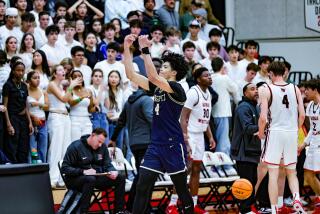Wheelchair Players Are Courting Entry Into a Rugged League
- Share via
Lou Cicciari’s knowledge of basketball was well-known.
He had played for years and had been a successful coach with the Granada Hills High junior varsity.
So when several Valley-area players became interested in starting another team, Cicciari was the logical person to recruit.
Cicciari also had another qualification that made him perfect for the job--he has no legs.
Cicciari helped put together the Fernando Valley Cobras, the only wheelchair basketball team in the Valley. The Cobras are expected to play in the Pacific Coast Conference of the National Wheelchair Basketball Assn. when the season begins in November.
The team is made up of wheelchair athletes with disabling spinal injuries or diseases such as spina bifida, a congenital spinal defect. Cicciari’s legs were amputated when he was 7 because of complications from a rare blood disease.
Like Cicciari, all the Cobra players share an affinity for basketball.
“At first, a guy will usually just sit and watch the game,” said Cicciari, who helped recruit players and serves as an adviser to the Cobras. “He might shy away from it or be a little apprehensive because he sees a lot of contact, guys falling out of their chairs.”
Like professional basketball, wheelchair basketball is physical. While these players don’t crash the boards for rebounds, bumping and ramming of chairs is common.
“The best teams are the ones that can score inside,” Cicciari said. “It gets pretty physical under the basket.”
Cicciari should know. He plays for the Los Angeles Stars, the dominant team in the eight-team Pacific Coast Conference.
In wheelchair basketball, players are allowed five seconds inside the key instead of three and double dribbling is not a violation. Traveling occurs when a player propels his wheelchair forward three consecutive times without dribbling the ball.
The biggest difference from regulation basketball, however, is that players rely on their arms for everything.
“They have to use their arms to move around, dribble and to shoot,” said assistant coach Richard Lovick, 28, of Canoga Park.
The Cobras have practiced together for about eight months and have played in several scrimmages.
More to Read
Get our high school sports newsletter
Prep Rally is devoted to the SoCal high school sports experience, bringing you scores, stories and a behind-the-scenes look at what makes prep sports so popular.
You may occasionally receive promotional content from the Los Angeles Times.






